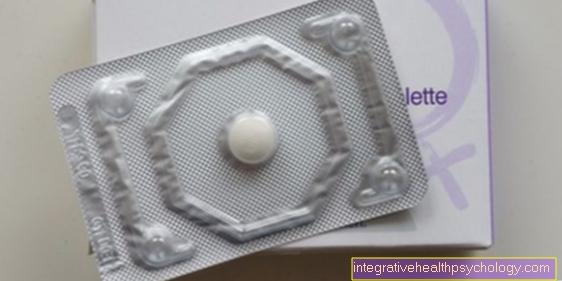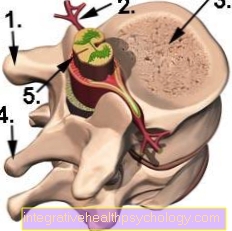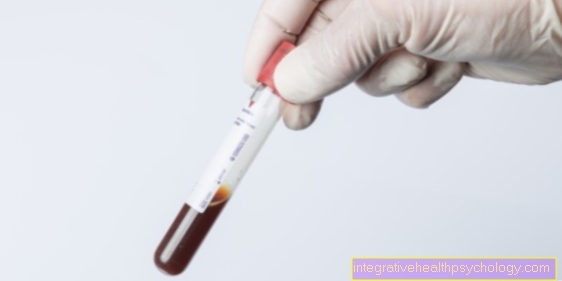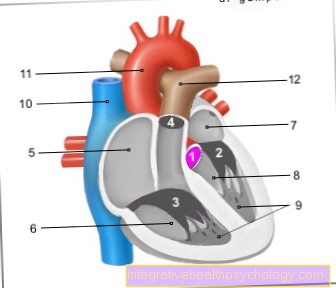Glandular fever and exercise
introduction
If you suffer from glandular fever, exercise must be handled with particular care. The body is often in a weakened state with this disease. Increased physical activity in the form of exercise would put further strain on the body and serious complications could occur as a result.

Symptoms
Usually the first symptoms appear about 6 weeks after infection. Until then, the patient has no complaints. The most important symptoms that occur in glandular fever are undoubtedly
- Sore throat,
- swollen lymph nodes
- and fever.
Of course, these symptoms do not have to occur, but they should be noted in most sufferers. Since the tonsils are just as often swollen and they are accompanied by a sore throat, the disease as such is often only discovered late, since infections or inflamed tonsils are first assumed.
More on this topic can be found here: You can recognize Pfeiffer's glandular fever by these symptoms
In the course of the main symptoms mentioned, there are of course characteristic accompanying symptoms such as tiredness, shivering, headache, night sweats and loss of appetite. Basically, these are all symptoms that could also be traced back to a common flu infection. Therefore, antibodies must be used to determine what the affected person is actually suffering from.
If the symptoms are more severe, it is easier to make a correct diagnosis. For example, this would be an enlarged spleen or an enlarged liver (see also: swollen liver) or a severe rash. Above all, the enlarged organs can lead to big problems if you don't stick to a few things, on the one hand to give up alcohol if you have an enlarged liver and to do without sport and a lot of movement if the spleen and liver are enlarged.
The disease can also take a chronic course that is not fatal, but severely restricts those affected. This can lead to a fever that lasts for years and the corresponding symptoms mentioned above. The difference to an acute course, however, is the duration, this fact can also lead to mental illness, since the affected are heavily stressed.
There is no special therapy for the disease. Symptoms are mainly treated and relieved until the condition clears on its own.
Is it allowed to do sports with Pfeiffer's glandular fever?
In Pfeiffer's glandular fever, a possible and very common symptom is swelling of the spleen (Splenomegaly). It becomes a lot larger and therefore more prone to ruptures (ruptured spleen) because the tissue is extremely tense. It is not uncommon for accidents or wrong movements to happen in sports. These can cause such a rupture of the spleen, which is definitely an emergency and an emergency operation must be carried out directly.
The symptoms are very characteristic. The affected person has severe pain in the spleen area and shock-like conditions such as palpitations, dizziness, sweats and anxiety can occur. If the ruptured spleen is not treated immediately, the large blood loss can lead to a drastic drop in blood pressure and, in this context, to fainting. In addition, other organs can no longer be adequately supplied if too much blood has escaped. Acute kidney failure can occur. Because the spleen is one of the lymphatic organs and it is a very well perfused organ. If a rupture occurs, an enormous amount of blood enters the abdomen. The affected person threatens to bleed to death if he is not operated on immediately.
Unfortunately, not only can the spleen tear, but the liver can also tear. Symptoms are similar to those of a ruptured spleen. Often these cracks are caused by so-called blunt abdominal trauma. This is very often the steering wheel in a car accident or the bicycle handlebar. Even with a ruptured liver there is serious bleeding that must be stopped immediately by means of an emergency operation. This is also an absolute emergency. It is not uncommon for even larger vessels, such as the hepatic artery, to be additionally affected, through which the blood can escape even faster into the abdominal cavity. Doctors usually initially wrap abdominal towels around the organ to stop the bleeding. After some time, the next operation follows, during which these cloths are removed again and where you can see whether the bleeding has been stopped. In addition, in some cases it is necessary to remove entire parts of the liver or the entire spleen if otherwise the bleeding cannot be stopped.
Read more on the subject at: Liver tear
You can live very well without a spleen. There are numerous vaccinations that counteract the weaker effect of the immune system. The liver can regenerate to a large extent. Individual parts can even grow back again.
Of course, it is also not recommended to exercise during the illness, especially not if you are suffering from a fever and similar flu-like symptoms. The body can only become completely healthy if you give it the appropriate time and let it rest.
Can my child play sports?
The same applies to children as to adults - they should not exercise, but rest. It is also important to ensure that you are not allowed to lift anything heavy. You should be very careful, especially with children, because small children often have a very high urge to move and are certainly not aware of the consequences of a fall.
If a swelling of the spleen is known, it should always be ensured that the child spares himself at least 8 weeks after the disease has ended. Before you go back to the sport, you should definitely visit your doctor again and see whether the swelling of the spleen has receded.
Often, however, it is not even necessary to explicitly point out to the children that they should take care of themselves during the illness, as they often feel very bad and stay in bed by themselves and are too weak and sickly to get up. The symptoms are usually great tiredness, severe exhaustion, severe sore throat, abdominal complaints such as nausea, vomiting or diarrhea, cough, loss of appetite, swollen tonsils and swollen lymph nodes. Unfortunately, the symptoms in babies or very young children are often not very specific, which is why an illness with glandular fever is often recognized very late.
Read more on the topic: Glandular fever in the child
Why shouldn't you do sports?
The most important reason for a ban on sports in the case of Pfeiffer's glandular fever is the risk of a ruptured spleen, as the spleen is significantly swollen in some people affected. Another reason is general weakness and fever, as the body needs all of its energy to fight the virus.
In the acute phase of the disease, those affected often have difficulty breathing because the tonsils are swollen and inflamed. The symptoms, especially the swelling of the spleen, do not all go away at the same time, which is why there is still a ban on sports even after subjective improvement.
How long is no sport allowed?
As with most infectious diseases, the body needs some time to regenerate after an infection. With the Ebstein-Barr virus, which causes Pfeiffer's glandular fever, this pause is particularly important. A rough guide is to take a break from exercise and exercise of around four weeks after the last symptoms have subsided.
Even during the illness there is an absolute break in sports and heavy lifting should also be avoided. With Pfeiffer's glandular fever, the time until complete healing and thus the release for exercise depends, in particular, on the size of the spleen.
If the spleen is significantly enlarged, the sport break is longer, while if the spleen is not enlarged, sport can be started earlier. The doctor can determine the size of the spleen with an ultrasound. If the spleen is enlarged, there is a risk of rupture of the spleen during exercise, which can be life-threatening. Long courses can mean breaks in sports of several months.
Read more on the topic: Duration of Pfeiffer's glandular fever
When is it allowed to do sport in a chronic condition?
In rare cases, Pfeiffer's glandular fever can be chronic and those affected suffer from fatigue and fever for months to years. If you have a fever, you shouldn't do sports, as the disease is being acutely fought and the body needs the energy. The other major symptom is spleen swelling. If the spleen is not enlarged and there is no episode of fever, sport can be done after consulting the attending physician.
Find out more about the topic here: Chronic Pfeiffer's glandular fever
Complications due to too early exercise
In the case of Pfeiffer's glandular fever, the spleen can enlarge. This enlargement does not always subside at the same time as the other symptoms. Even with a perceived improvement, i.e. after the tonsillitis and the fever have subsided, the spleen can still be so swollen that the organ can tear if the stress is too high.
A ruptured spleen can be life threatening. Another consequence of not taking care of yourself after serious infectious diseases can be inflammation of the heart muscle or the pericardium. The symptoms are, similar to a heart attack, severe pain in the chest area and a subjective shortness of breath. Disease flare-up after symptoms have subsided is rare and usually not due to premature exposure. Sport should be started slowly after the prescribed rest phase, as the body is not yet fully capable of resilience.
Glandular fever and alcohol consumption
In the acute phase of the disease it can lead to a Enlargement of the liver (Heptomegaly) come. With a liver enlargement there is two different variants: on the one hand the harmonic heptomegaly and the disharmonious heptomegaly. This comes about because the Liver divided into different segments becomes. Overall there is 8 different areas of the organ, which individually and independently supplied with vessels become. Because of these separations, the liver can only be enlarged in certain segments. As the liver one very important metabolic organ is and extremely important for our body, especially because it breaks down a lot and the Organism detoxified, is a Magnification is not particularly beneficial and one should pay attention to some things.
she not only breaks down drugs and toxins, rather also drinks like alcohol. Is that now Enlarged liver and apparently affected, one should Avoid alcohol consumption whenever possible. This would help the liver even more overused will and it can too irreparable damage come. Of the Alcohol must first be splitbefore he is eliminated. For this, in the liver, or more precisely in the liver cells, Enzymes ready to take the Break down alcohol into acetaldehyde, which is harmful to the body. Has the Liver enough capacity, will this immediately further converted into acetate. This is what there is Aldehyde dehydrogenase enzyme. But the liver can no longer break down the acetaldehyde, since it no longer works properly, it can bad consequences for the body because the Liver cells are severely damaged.
But the liver has the advantage that it is regenerate damaged liver cells if you have the time. That means that you have a Refrain from alcohol for a long time should. Only if you adhere to this can you put a stop to major and irreparable damage.
Due to the enlarged liver, the disease and the alcohol consumption it can lead to a enormous remodeling of the organ come and to major loss of functionality. This happens so much faster than if "just" too much alcohol is drunk without the liver being enlarged. In the worst case is the liver like that scarredthat they shrinks and to a large extent does not work anymore. They are then called one Shrink liver.



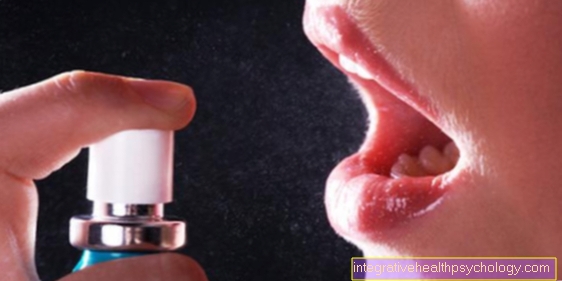
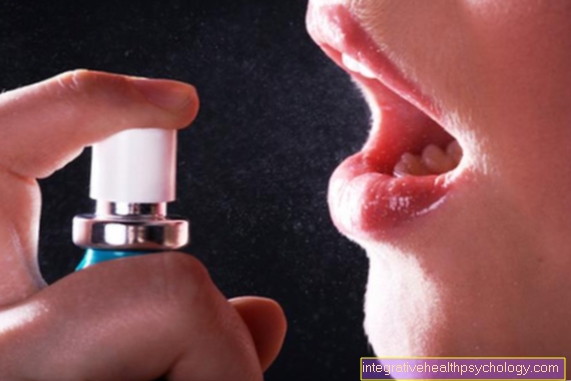


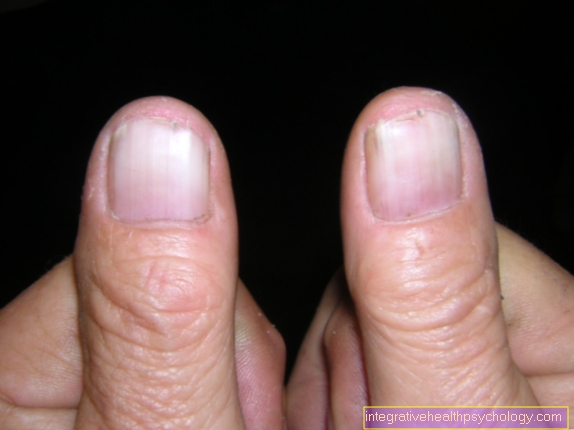
.jpg)


